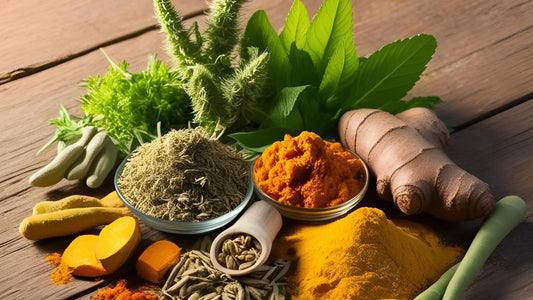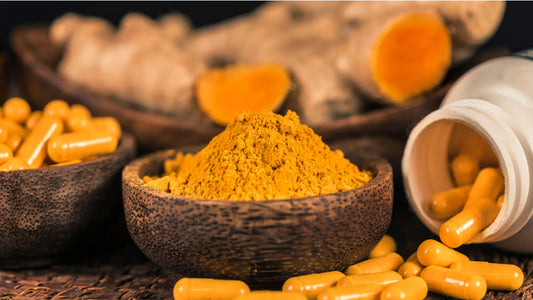
How Turmeric Can Transform Your Health: 5 Remarkable Benefits
Turmeric, a golden-yellow spice, has been used for centuries in traditional medicine and cooking. Known for its potent anti-inflammatory and antioxidant properties, turmeric is not just a culinary delight but a powerhouse of health benefits. This blog post dives into five remarkable ways turmeric can transform your health, leveraging key SEO-friendly keywords to ensure it's informative and accessible.
What is Turmeric?
Turmeric, a vibrant yellow spice, has been a cornerstone in culinary traditions and medicinal practices for centuries, especially in Asia. Beyond its culinary use to add flavor and color to dishes, turmeric offers a myriad of health benefits, largely attributed to its active compound, curcumin. This ancient root, celebrated for its anti-inflammatory and antioxidant properties, plays a significant role in Ayurvedic medicine. The Ayurvedic benefits of turmeric are numerous, including enhancing digestion, boosting immunity, and supporting skin health. While turmeric is generally safe for consumption, it's important to be aware of the side effects of turmeric, which can include digestive discomfort when taken in large amounts. The turmeric dosage for health benefits varies, but incorporating it into your daily diet can offer a natural health boost.
What is Curcumin?
Curcumin is the active compound found in turmeric that is responsible for its vibrant color and a host of health benefits. This powerful antioxidant is what makes turmeric a staple in both the culinary and medicinal world. The benefits of curcumin include its ability to reduce inflammation, support joint health, and enhance heart health, making it a valuable component in the treatment and prevention of various health conditions. However, the bioavailability of curcumin is relatively low, which means its absorption can be challenging without the right combination of ingredients, such as black pepper, which contains piperine, an alkaloid that enhances curcumin's absorption. Understanding the optimal turmeric dosage is essential for maximizing the benefits of curcumin while minimizing potential side effects. Incorporating curcumin into your health regimen can contribute significantly to overall well-being, embodying the essence of preventative and holistic healthcare approaches.

What are the 5 Ayurvedic benefits of turmeric?
Boosts Anti-Inflammatory and Antioxidant Capacity
Turmeric contains curcumin, a compound with strong anti-inflammatory properties comparable to some pharmaceuticals, without the side effects. Inflammation is a necessary response to injury or infection, but chronic inflammation can lead to various diseases. Incorporating turmeric into your diet can help reduce this risk. Additionally, curcumin is a potent antioxidant that neutralizes free radicals and stimulates the body's own antioxidant enzymes, bolstering your defense against oxidative stress.
Enhances Brain Function
Recent studies have linked curcumin in turmeric to increased levels of brain-derived neurotrophic factor (BDNF), a type of growth hormone that functions in the brain. Low levels of BDNF are associated with various cognitive disorders, including Alzheimer’s disease. By boosting BDNF, turmeric could help delay or reverse brain diseases and age-related decreases in brain function, enhancing memory and making you smarter.
Lowers Risk of Heart Disease
Heart disease is the world’s leading cause of death, but turmeric can play a key role in reversing many steps in the heart disease process. The main benefit of turmeric for heart health lies in improving the function of the endothelium, the lining of your blood vessels. Curcumin improves endothelial function, reducing inflammation and oxidation, which are key contributors to heart disease. Additionally, it reduces the risk of blood clots and arterial plaque buildup.
Prevents and Treats Cancer
Cancer is characterized by uncontrolled cell growth, and curcumin found in turmeric has been shown to affect cancer growth and development at the molecular level. Studies suggest that it can reduce angiogenesis (growth of new blood vessels in tumors), metastasis (spread of cancer), and contribute to the death of cancerous cells. While more research is needed, turmeric shows promise as a complementary cancer treatment.
Alleviates Symptoms of Arthritis
Arthritis is a common disorder characterized by joint inflammation. Given turmeric’s high anti-inflammatory properties, it’s no surprise that it helps with arthritis. Several studies show that curcumin can help treat symptoms of arthritis and in some cases, is more effective than anti-inflammatory drugs.
Incorporating Turmeric into Your Diet Turmeric Dosage
Adding turmeric to your diet is simple. You can include it in your cooking, like curries, soups, or smoothies. However, curcumin is poorly absorbed into the bloodstream, so consuming it with black pepper, which contains piperine, is beneficial, enhancing curcumin absorption by 2,000%.
Conclusion
Turmeric is more than just a spice; it’s a medicinal herb with numerous health benefits. From boosting brain function to fighting chronic diseases, the potential health ayurvedic benefits of turmeric and curcumin are impressive. Whether you’re looking to improve your general health or target specific conditions, incorporating turmeric into your diet could have profound health implications.



